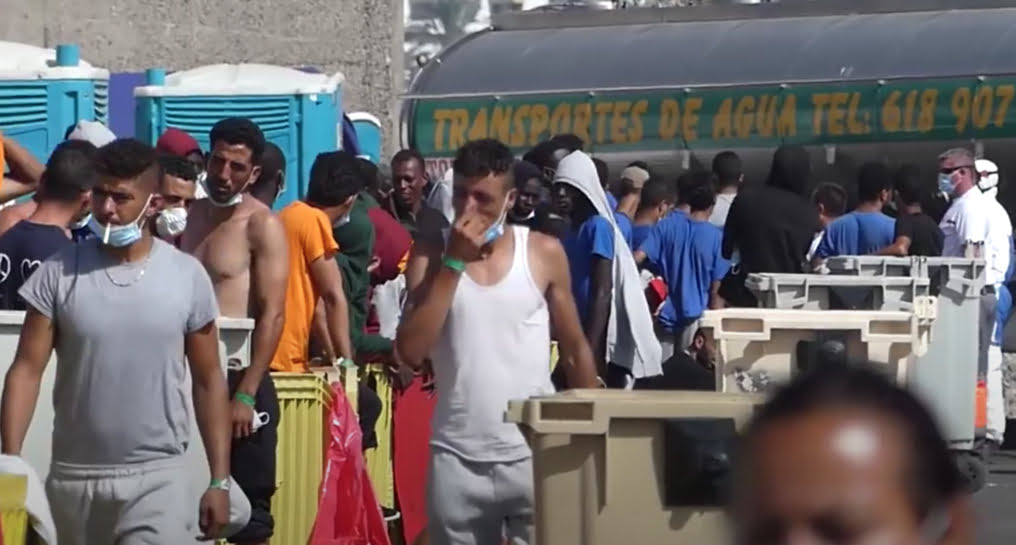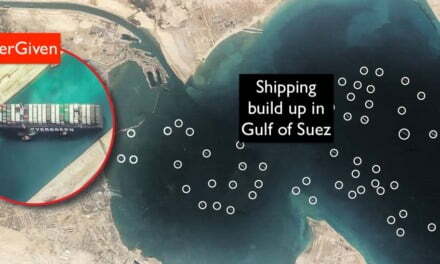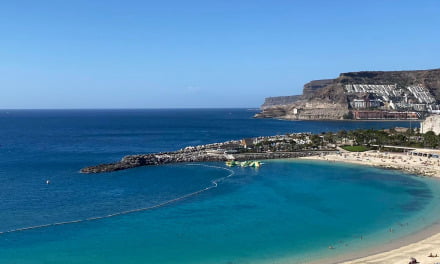As well as a regional government, and local councils (municipios), the Canary Islands also has an added political layer of Island Councils (Cabildos Insulares). The Cabildo de Gran Canaria is our island’s representative government, made up of every local mayor and representatives of all the major parties. The current president of the island Cabildo de Gran Canaria, since 2015, is Antonio Morales (from the Nueva Canarias party – NC). In a strongly worded statement, on his own personal blog, he has today warned that, in his opinion, the neighbouring Kingdom of Morocco may well be instrumental in the current migrant crisis affecting the island. He believes it is part of a concerted policy of Moroccan immigration and blackmail, to strengthen their negotiating positions with Europe.
In fact, he believes that there may be insidious motivations for Morocco to be ignoring international law, as well as migrant departures from coastlines they control, in an attempt to expand their own economic interests, and encroach on the waters of the Canary Islands, using the archipelago as a bargaining chip to gain control not just of fishing rights but also a huge deposit of valuable metals and rare earths contained in an undersea mountain less than 300 miles south of these islands. Moroccan immigration and blackmail is a serious allegation, which Morales backs up with several pieces of evidence, in his view, proving an expansionist policy that risks serious conflict in the region, with unpredictable results.
Here is what he has to say, interpreted by our editor-in-chief Edward Timon .
Antonio Morales, President of Cabildo de Gran Canaria
“I am convinced that the different events that the Canary Islands have been experiencing in recent months in relation to the kingdom of Morocco are not the result of chance. The increase in migrants, especially young people and minors from the Moroccan coasts without the intervention or control of the authorities, the pretense of delimiting jurisdictional waters in conflict with the maritime zone that belongs to the Canary Islands or the administration of the [artisanal fishing] wealth of the Canarian-Saharan bank and phosphates in territories that are pending self-determination because they belong to the Saharawi people; these are not isolated decisions but I believe that they are integrated into a strategy of using the Canary Islands to pressure and blackmail Europe and Spain.
Last April, during confinement due to the coronavirus, the Official Gazette of Morocco published two laws approved by Parliament in January and February, with which the country unilaterally and illegally extended its maritime border to the Canary Islands. In this way, in an act of expansionism, Morocco establishes its territorial waters at 12 miles, delimits its exclusive economic zone at 200 miles and has decided to expand its continental shelf up to 350 miles, thus, in addition to annexing the waters of Western Sahara, despite that being a territory pending decolonization, [the new Moroccan laws] would include a part of the Canarian waters that Spain has claimed from the UN since 2014.
A few months later, there was a sudden increase, unprecedented since the “cayuco crisis” in 2006, in the arrival of migrants in boats to the Canary Islands, in particular to Gran Canaria. So far this year it is [more than] 17,000 people, of which around 11,000 have made it to Gran Canaria. The Arguineguín Harbour has become a “camp of shame” in which thousands of people spend days, and even weeks, crammed into 400 square meters, in subhuman conditions. Many of these people are Moroccan citizens and many of these vessels departed from Moroccan territory.
Last week the Moroccan army attacked Sahrawi civilians who were peacefully demonstrating in the Guerguerat buffer strip, south of the Sahara, against the illegal breach that the Moroccan Government had opened in this place. Both the breach and the attack by military personnel represent a clear violation of the military agreement, and are contrary to the established peace plan. This has generated an escalation of military confrontations with unpredictable consequences.
Graphic courtesy of ABC used by Antonio Morales do illustrate his claims of Moroccan immigration and blackmail
One only has to see the interconnection of the facts to reach the conclusion that Morocco is using the Canary Islands as a bargaining chip to pressure the Spanish State so that it does not interfere in their expansionist plans over our waters and Western Sahara, as well as to prevent it from assuming a more active role as the colonial power in the Sahara (which it still is) to demand the holding of the referendum and the culmination of the decolonisation process for this territory.
This would also explain the sudden increase in migratory flows over to our archipelago since it would be one of the ways that the Alawite Kingdom could pressure Spain at a time of intensification in the conflict with Western Sahara. Because, although police and military routes cannot be the way to manage migration, it is also clear that Morocco has [sufficient] control over its territory to be able to stop the arrivals of boats to our coasts, especially those of their own fellow citizens.
And it is not the first time that the economic and geostrategic interests of both territories have come into conflict. The most flagrant case is that of the Canarian Saharan fishing bank, de facto managed by Morocco despite not being part of its territory and which is even included in fishing agreements with the EU (although they have been subsequently suspended). According to the Canarian Intersindical Union, our islands are losing at least 400 direct jobs and more than 1,000 indirect jobs due to not being able to fish in waters that correspond to us for historical and geographical reasons.
As in the case of fishing, the maneuver to appropriate the Saharawi waters, and claims on a part of the Canarian waters, corresponds not only to an expansionist but also an economic desire. Although it is still a long way from being exploited, Morocco is fighting for Mount Tropic, located some 269 miles south of El Hierro. It is estimated that [this undersea mountain] may contain the largest deposit in the world of tellurium [a rare semi-conductive metal] with 6,000 times more than what is currently extracted from the earth’s crust. To this can be added cobalt and rare earths present in the area, fundamental raw materials for the economy of the future.
As serious as this is, it is with lukewarmness or even passivity that the Government of Spain has responded to the annexationist claims and the fait accompli policy of our neighboring country. Furthermore, these two laws were approved days before an official visit to Morocco by the Minister of Foreign Affairs, European Union and Cooperation, Arancha González Laya, in an obvious gesture applying pressure to diplomatic negotiations with Spain. So far the minister has limited herself to transmitting calm to the Canary Islands and guaranteeing the government’s support for our territory without this having been translated into concrete gestures.
I am convinced that in the end this dynamic is detrimental to both territories. Relations between Morocco and the Canary Islands are historical. About 40,000 Moroccan citizens have lived with us for years and it is clear that cooperation in commercial, tourism or renewable energy matters could be very beneficial for both. The Canary Islands occupy a very important geostrategic position and one of our aspirations is to have relations of peace and cooperation with our neighbors.
But for this to be possible, it is essential that Morocco stop using the Canary Islands and the lives of thousands of people who come to our coasts in boats as a method of applying pressure in its diplomatic relations with Spain, relaxing control of its coasts and borders to increase migration pressure every time they want to negotiate something. And of course it is unacceptable that in its expansionist zeal it intends to appropriate the resources of the Canarian-Saharan fishing bank or the underwater resources.
It is also essential that Morocco complies with international law, that it puts an end to the illegal occupation of Western Sahara, stops its expansionist claims and commits itself to holding the [promised] referendum on the independence of this territory. Otherwise, as we are seeing, sooner or later we will find a warlike escalation 100 kilometers from our territory that would pose a serious risk to the Canary Islands and a total breakdown of relations with the neighboring country.
For its part, the Government of Spain cannot continue to disparage and ignore the Canary Islands, prioritizing its diplomatic relations with Morocco over the well-being of our archipelago. The lukewarm response of the Ministry of Foreign Affairs to what could be considered an attack on the Canary Islands, such as the annexation of a part of our waters, is not acceptable. We must have a voice in Spanish policy towards Morocco.
The commitment of the Canary Islands and the progressive Canarian nationalists cannot be other than to position the islands as a territory of peace, a host country with democratic values that promotes cooperation and progress among neighboring peoples. But this can only be possible from [a position of] firmness and determination and the demand that Morocco strictly comply with international law and respect for territorial integrity, both of Western Sahara and of our archipelago.”















